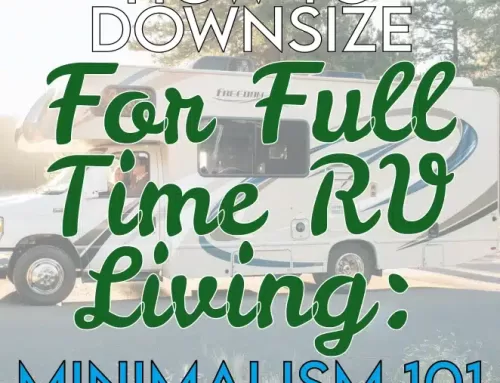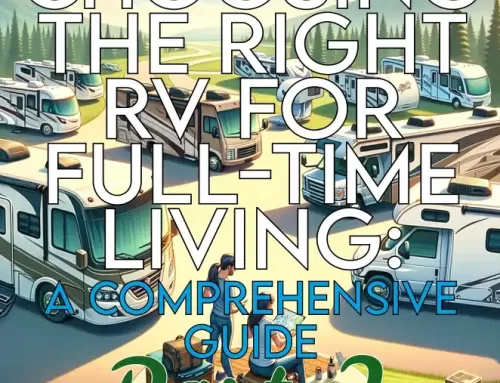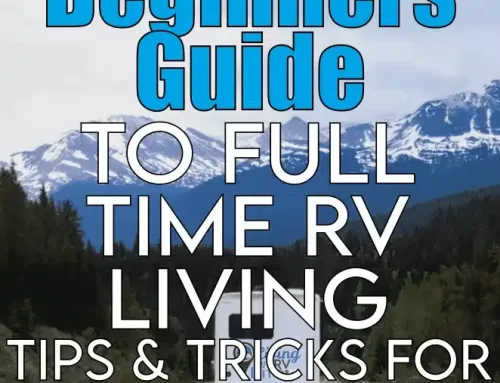Introduction
 Embarking on a journey of full time RV living in a recreational vehicle is not just a lifestyle choice; it is a bold step towards embracing freedom, adventure, and a unique way of life. This nomadic lifestyle has gained significant popularity, offering an unparalleled sense of liberty and the opportunity to explore the vast landscapes and diverse cultures across the country or (for the most adventurous) continent.
Embarking on a journey of full time RV living in a recreational vehicle is not just a lifestyle choice; it is a bold step towards embracing freedom, adventure, and a unique way of life. This nomadic lifestyle has gained significant popularity, offering an unparalleled sense of liberty and the opportunity to explore the vast landscapes and diverse cultures across the country or (for the most adventurous) continent.
However, the cornerstone of this exciting journey is selecting the right RV. Your RV is not just a vehicle; it is your home, your sanctuary, and your constant companion on the road. The decision to choose the right RV is crucial and multifaceted. It is about finding a balance between comfort, functionality, affordability, and, most importantly, a vehicle that resonates with your personal lifestyle and aspirations.
Imagine waking up to the serene views of a misty mountain range, the calming sounds of a nearby stream, or the vibrant hues of a bustling cityscape – all from the comfort of your mobile abode. This dream can only turn into reality with an RV that aligns with your needs. Whether it is a compact, easy-to-navigate Class B motorhome for solo travelers or a spacious, luxurious Class A for a family adventure, the right choice sets the tone for your experiences ahead.
Moreover, the benefits of choosing the right RV extend beyond the aesthetics and comfort. It is about sustainability on the road, managing resources, adapting to various climates, and ensuring your mobile home can withstand the rigors of constant travel. It is also about the joy of customizing your space, making it a reflection of your personality and a comfortable haven no matter where you are.
As we delve into this comprehensive guide, we will explore the various types of RVs, key factors to consider, and practical tips to help you make an informed decision. Whether you are a seasoned RV enthusiast or a curious newcomer, this guide aims to equip you with the knowledge and confidence to embark on your full-time RV living adventure.
Join us on this journey to discover how to choose an RV that not only meets your needs but also enriches your life on the road, turning every mile into a cherished memory.
Understanding RV Types
When embarking on the journey of full-time RV living, one of the first and most important decisions you will make is selecting the type of RV that suits your lifestyle and needs. Each type of RV offers unique features, benefits, and challenges. Here, we explore the most common types to help you make a well-informed choice.
Class A Motorhomes
Class A motorhomes are the epitome of luxury and space in the RV world. Resembling buses in size and shape, they offer ample living space, often complete with full-sized kitchens, bathrooms, and sleeping areas. They are ideal for those who prioritize comfort and have a higher budget. However, their size can be a challenge when navigating narrow roads or finding parking.
Class B Motorhomes
Class B motorhomes, often known as campervans, are the smallest in the motorhome family. They are built on van chassis and are perfect for solo travelers or couples. Their compact size makes them easy to drive and park, and they are more fuel-efficient than their larger counterparts. While they offer less living space, many are ingeniously designed to maximize functionality in a small area.
Class C Motorhomes
Class C motorhomes strike a balance between the A and B classes. They are built on truck or van chassis and are recognizable by the over-cab sleeping or storage area. They offer more space than Class B motorhomes but are more manageable to drive than Class A. This type is a great middle-ground option for families or those who want a bit more space without the bulk of a Class A.
Fifth Wheel Trailers
Fifth wheel trailers offer a unique living experience. They require a pickup truck with a special hitch in the bed of the truck to tow. Known for their spacious interiors, including split levels with a raised forward section, they provide a home-like feel. They are ideal for those who already own a suitable pickup truck and want a balance between mobility and comfort.
Travel Trailers
Travel trailers are a popular choice for their versatility and range in size. They can be towed by a variety of vehicles, depending on their weight. These trailers offer a range of amenities and layouts, from basic to luxurious, providing options for every budget and style.
Teardrop Trailers
Teardrop trailers are small, lightweight, and streamlined, making them perfect for those who prefer a minimalist approach or have smaller towing vehicles. They are ideal for short trips and those who spend more time outside the trailer exploring.
Pop-up Campers
Pop-up campers are compact, lightweight, and easy to tow. They expand and provide more space when set up, making them a good option for those who want a balance between the tent camping experience and RV comfort. They are budget-friendly and suitable for smaller families or those new to RVing.
Understanding the types of RVs available is the first step in determining which vehicle will best suit your full-time RV living needs. Each type offers distinct advantages and may appeal to different lifestyles and preferences. Consider the size, amenities, budget, and your intended use to guide your decision-making process.
Factors to Consider When Choosing an RV
Choosing the right RV for full-time living involves more than just picking a vehicle; it’s about selecting a lifestyle. The following factors are crucial in ensuring that your choice aligns with your needs, budget, and long-term living plans.
Size and Space Needs
The size of the RV is a fundamental consideration. Ask yourself how much space you need to live comfortably. Larger RVs offer more living and storage space, which can be essential for families or those planning to live on the road for extended periods. However, bigger is not always better. Larger RVs can be more challenging to maneuver and limit the places you can park or camp. If you prefer flexibility and plan to move frequently, a smaller, more agile RV might be more suitable.
Budget Considerations
Your budget plays a critical role in the type of RV you can afford. Remember, the cost goes beyond the purchase price. Consider the ongoing expenses such as maintenance, fuel, insurance, and campground fees. Newer models come with higher price tags but often have less upkeep, whereas older models can be more affordable upfront but may require more maintenance. Balance your initial investment with the long-term costs to find a sustainable financial option.
Lifestyle and Comfort
Your lifestyle and the level of comfort you desire will influence your RV choice. If you plan to work from the road, you might need a layout that accommodates a workspace. Those who love cooking may prioritize a well-equipped kitchen. Consider the aspects of your daily life and how they will translate into an RV environment. Think about the climate you will be traveling in as well; if you are chasing sunnier climates, air conditioning and shade provisions become important, while heating systems are crucial for colder regions.
Fuel Efficiency and Maintenance
Fuel efficiency is an important consideration, especially for those who plan to travel extensively. Class B and C motorhomes, as well as smaller trailers, typically offer better fuel efficiency compared to the larger Class A motorhomes. Additionally, consider the maintenance requirements of the RV. Research the reliability of different models and understand what kind of maintenance they require. An RV that is easier and less costly to maintain can save a lot of headaches and expenses in the long run.
Resale Value
While not the primary concern for many, considering the RV’s resale value is prudent. Some RVs hold their value better than others. If you think you might upgrade or change your RV in the future, choosing a model known for its resale value can be a smart financial move.
Taking the time to carefully consider these factors will help ensure that you choose an RV that not only feels like home but also aligns with your lifestyle, budget, and travel aspirations. This thoughtful approach is key to finding the perfect RV for your full-time living adventure.
Essential Features for Full-Time RV Living
Transitioning to full-time RV living requires careful consideration of the features that will make your mobile home both comfortable and functional. Here are some of the key features to look for:
Kitchen and Appliances
A well-equipped kitchen is essential for daily living. Look for an RV with a functional kitchen layout, adequate counter space, and essential appliances like a refrigerator, stove, and oven. Some RVs also offer additional amenities like a microwave, a dishwasher, and even a full-size refrigerator. Consider your cooking habits and choose an RV that meets your culinary needs. For example, some newer RVs do not have propane powered appliances. Therefore electricity usage and capacity may need to a consideration.
Sleeping Arrangements
A comfortable sleeping area is vital for a good night’s sleep. Many RVs offer convertible sofas or dinettes that turn into beds, but if you are living full-time, you might prefer a dedicated bed space. Look for RVs with queen or king-size beds, quality mattresses, and sufficient privacy. Some larger RVs offer separate bedrooms, which can be a great advantage if you’re traveling with family. If the mattress isn’t comfortable, you should be able to upgrade it – either via the dealer you are working with (if you are working with an RV Dealer) or buy purchasing a new RV specific mattress from a vendor.
Storage Solutions
Ample storage is a necessity for full-time RV living. Look for an RV with smart storage solutions such as overhead cabinets, under-bed storage, and outdoor compartments. Closet space for clothes, as well as kitchen storage for food and utensils, are particularly important. Efficient use of space is key in an RV, so consider layouts that maximize storage without compromising on living space.
Work and Connectivity Solutions
If you plan to work from your RV or need regular internet access, ensure your RV can support this lifestyle. Some RVs come equipped with built-in desks or office areas. Additionally, consider the need for strong and consistent internet connectivity. Solutions like Wi-Fi extenders, cellular data boosters, or satellite internet can be vital for staying connected.
Climate Control and Insulation
Proper insulation and climate control are critical for comfort, especially when traveling through areas with extreme temperatures. Look for RVs with efficient heating and cooling systems. Double-paned windows, high-quality insulation, and weatherproof seals can make a significant difference in maintaining a comfortable interior temperature.
Bathroom and Sanitation
A functional bathroom is crucial. Consider the size and layout of the bathroom, and whether it includes a full-size shower, a flushing toilet, and a sink. Also, evaluate the RV’s water storage capacity, hot water system, and waste management system to ensure they meet your needs for extended living. Remember that RV holding tanks need to be emptied regularly, so this is a consideration you must remember.
Energy Management and Sustainability
For full-time living, efficient energy management is key. Look for RVs with good battery systems, solar panels, and generators. These features will help you stay off-grid longer and reduce your reliance on campsite utilities. LED lighting, energy-efficient appliances, and water-saving fixtures can also contribute to a more sustainable and cost-effective living environment.
Each of these features contributes to the overall comfort, functionality, and sustainability of your RV living experience. When choosing your RV, prioritize these features based on your personal needs and lifestyle to ensure your full-time RV living is as enjoyable and hassle-free as possible.
Navigating Legal and Practical Concerns
Embarking on a full-time RV lifestyle is not just about choosing the right vehicle and packing up; it also involves navigating a range of legal and practical concerns. Being well-informed about these aspects is crucial for a smooth and enjoyable experience.
Registration and Insurance
Registering and insuring your RV are among the first legal steps. The registration process varies by state and province, so it is important to understand the requirements of your home province or state or the state or province you plan to register your RV in. Insurance is another critical aspect, and it is advisable to look for policies specifically designed for full-time RVers, as they offer coverage that aligns with the unique needs of living on the road.
Driving License Requirements
Depending on the size and type of your RV, you may need a special driver’s license. In some provinces and states, large RVs, especially those over a certain weight, require a commercial driver’s license (CDL) or a special non-commercial license. Check the requirements of the state or province where your vehicle is registered to ensure compliance.
Parking and Camping Regulations
Understanding where you can legally park and camp is essential. This includes overnight parking rules, which vary widely. Some places allow overnight parking in designated areas, while others have strict prohibitions. Familiarize yourself with the regulations in the areas you plan to visit. Additionally, consider the rules and amenities of various campgrounds and RV parks, especially if you plan to stay in one location for an extended period. There are apps available to help you find different parking spots, both free and paid, so be sure to take advantage of those when you can.
Mail and Residency Issues
For full-time RVers, managing mail and establishing legal residency can be challenging. Many choose to use mail-forwarding services and establish residency in RV-friendly states and provinces. Research and understand the tax implications, voting requirements, and other factors associated with establishing residency in a particular province or state.
Healthcare and Medical Needs
Access to healthcare is an important consideration, especially for those with ongoing medical needs. Look into telehealth services and nationwide health insurance plans that offer flexibility for travelers. Also, keep a well-stocked first aid kit and know the locations of medical facilities along your route. If you are travelling out of your home country, additional medical should also be purchased. For example, Canadian snowbirds should purchase additional medical insurance when travelling through the United States.
Financial Management
Managing finances on the road requires planning. Consider how you will access banking services, pay bills, and manage expenses while traveling. Online banking and digital financial services can be invaluable tools for full-time RVers. I know, as Canadian RVers, we find using our Canadian financial products in the US can be challenging. For example, using a credit card or debit card. You may find some businesses will only accept swiping your card, while others will use tap or insert with PIN. The systems don’t seem to be as coordinated as in Canada, where tap works almost everywhere, as does inserting your card and using a PIN. As a Canadian, if you are travelling abroad, you must also remember the exchange rate will impact your purchases.
Connectivity
Staying connected is important for safety, work, and social reasons. Research the best options for internet access, which might include mobile hotspots, satellite internet, or campground Wi-Fi. Also, consider a reliable cell phone plan that offers extensive coverage.
As experienced RVers have already figured out, you should have multiple ways to access the internet. Currently, we use Starlink for our primary connection, but also have unlimited cell phone plans as backup. Also, if needed, we could connect to campground Wi-Fi if needed. Keep in mind, however, that not all RV parks or resorts in the US or Canada offer free Wi-Fi – some do not, while others may offer it only in designated areas, such as around the office, or in a clubhouse setting.
By addressing these legal and practical concerns, you can ensure a more secure and enjoyable full-time RV living experience. Proper planning and preparation in these areas will allow you to focus on the adventure and joy that comes with life on the road.
The Importance of a Test Drive
Taking an RV for a test drive is an essential part of the decision-making process. It is not just about how the vehicle feels on the road; it is also an opportunity to ensure that it meets your expectations in terms of handling, comfort, and functionality. Here is what to focus on during a test drive:
Handling and Maneuverability
One of the most important aspects to assess during a test drive is how the RV handles. Pay attention to how it feels on the road, its turning radius, braking response, and visibility. Larger RVs, like Class A motorhomes, can be quite different to drive compared to smaller Class B or C models. Ensure you are comfortable with the vehicle’s size and how it maneuvers, especially if you plan to drive in various terrains and weather conditions.
Also ensure that you are comfortable with how the mirrors are set up and if you feel comfortable using them, especially when backing up. While many newer motorhomes and RVs come with (or are wired to use) backup cameras, not all have them. A backup camera can be a huge time saver, but you should not rely solely on a backup camera. You should be comfortable backing up your RV without having to rely exclusively on a backup camera.
Living Space Comfort
While the driving experience is crucial, do not overlook the living aspect. Spend time in the RV while it is stationary. Walk through it as if you were living there: sit on the furniture, lie on the bed, move around the kitchen, and check the bathroom. This helps you get a feel for the space, layout, and practicality of the living quarters.
Noise and Vibration Levels
Notice the noise and vibration levels while driving. Excessive noise or vibration can be a sign of mechanical issues or poor insulation, which could impact your comfort, especially on long drives. A quiet and smooth ride contributes significantly to a pleasant driving and living experience.
If you feel there are vibrations or noises which should not be there, consider consulting with an RV mechanic to ensure those noises and vibrations are “normal” or are not a sign of an underlying problem.
Appliance and Feature Testing
Test all the features and appliances to ensure they are in good working order. This includes the heating and cooling systems, water heaters, kitchen appliances, entertainment systems, and any slide-outs or awnings. Functionality issues can be costly to repair, so it’s better to identify them before making a purchase.
Questions to Ask
Prepare a list of questions to ask the seller or dealer. Inquire about the RV’s maintenance history, any previous repairs or accidents, warranty coverage, and any unique features or quirks. Understanding the vehicle’s history can help you make a more informed decision.
Expert Opinion
If possible, bring along someone knowledgeable about RVs, such as a mechanic or experienced RVer, during the test drive. They can provide valuable insights and may notice things that you might miss.
A thorough test drive is more than just a formality; It is a critical step in finding an RV that not only drives well but also feels like home. By paying attention to these aspects, you can be more confident in your decision and enjoy peace of mind on your full-time RV living adventure.
Stay tuned for Part 2….







